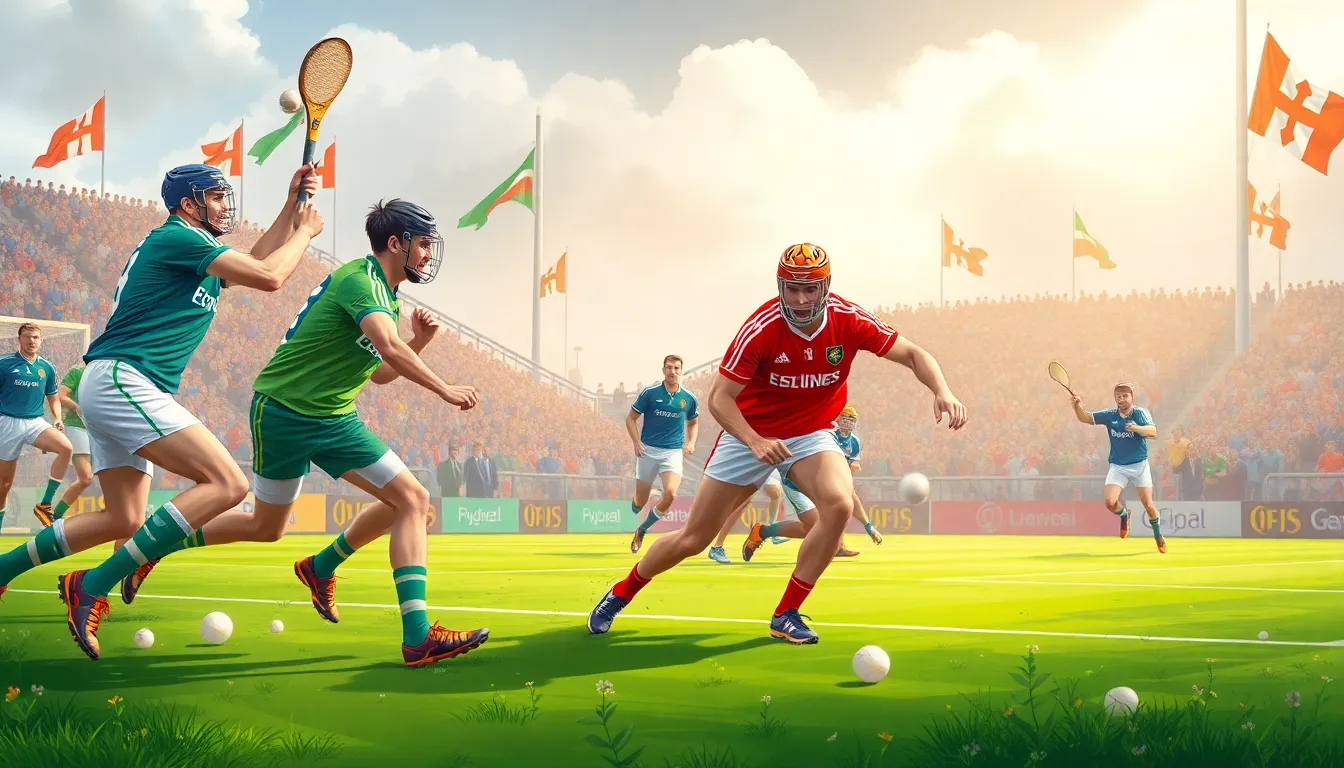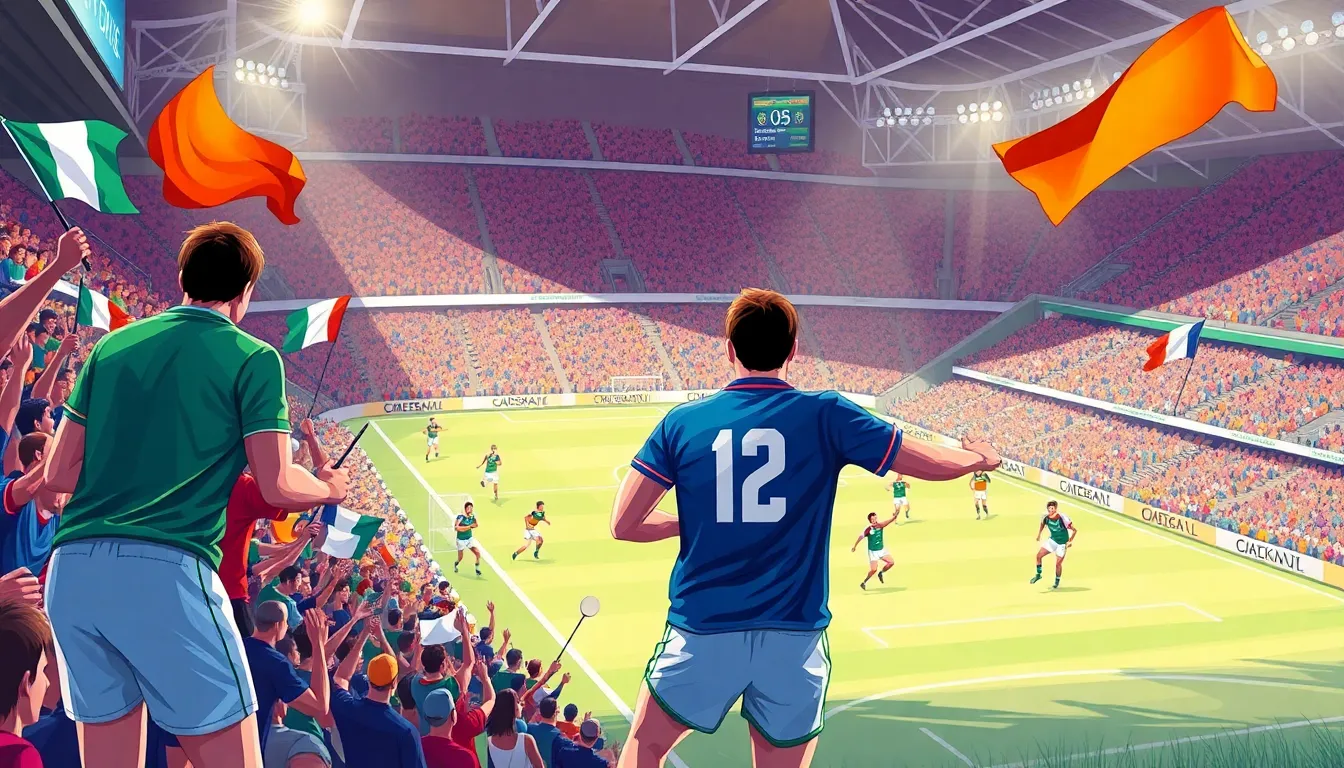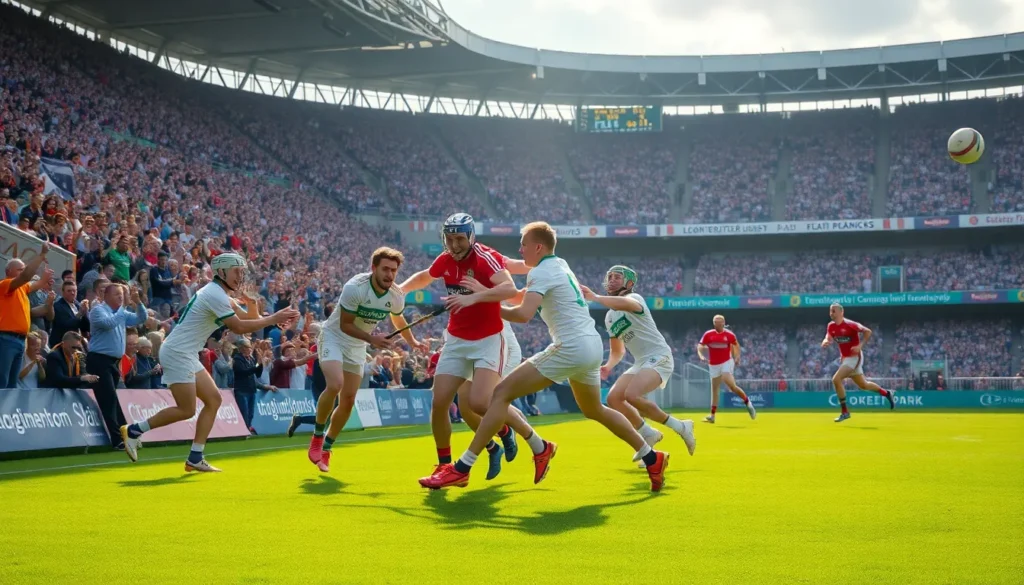When it comes to sports, Ireland knows how to bring the heat—whether it’s hurling, Gaelic football, or a good old-fashioned pub quiz. These aren’t just games; they’re a way of life, steeped in tradition and a dash of friendly rivalry. Picture this: a high-speed clash of sticks and balls, where the only thing flying higher than the score is the excitement in the crowd.
Irish sport isn’t just about athletic prowess; it’s about community, celebration, and a few cheeky pint toasts along the way. From the roaring fans in Croke Park to the local fields where legends are born, the spirit of competition runs deep. So grab your jersey and get ready to dive into the vibrant world of Irish sport, where every match tells a story and every player is a hero in the making.
Irish Sport
Irish sport embodies a rich tapestry of history, culture, and community. Traditional games hold an essential place in the heart of Ireland, where participation and passion thrive.
Historical Background
Hurling dates back over 3,000 years, with roots intertwined in Irish heritage, making it one of the oldest team sports worldwide. Gaelic football emerged in the late 19th century as part of the Gaelic Athletic Association’s efforts to preserve Irish culture. Both sports evolved from ancient pastimes, solidifying their status in modern times. The establishment of the GAA in 1884 marked a significant turning point, fostering competitive spirit and unity across Ireland. Legends surround iconic players, reflecting the ongoing legacy these sports create in communities.
Cultural Significance
Sports in Ireland transcend mere competition, serving as crucial elements in the social fabric. Communities gather to cheer for local teams, reinforcing bonds and celebrating shared identity. Marriages, birthdays, and festivals often align with sporting events, highlighting the communal aspect of these games. Hurling and Gaelic football foster local pride and encourage youth participation. Schools promote these sports, ensuring the next generation appreciates their historical roots and cultural impact. Engaging in these activities reinforces teamwork and resilience, contributing positively to personal development.
Popular Irish Sports


Irish sports reflect a rich cultural heritage and community spirit. Here are some prominent examples.
Gaelic Games
Gaelic games include hurling and Gaelic football, both managed by the Gaelic Athletic Association. Hurling, over 3,000 years old, features fast-paced action and requires agility and precision. Gaelic football, developed in the late 19th century, combines elements of soccer and rugby. Players aim to score points by kicking or punching the ball into the opposing goal. Both sports emphasize teamwork and local pride, as communities rally behind their teams during matches, fostering social connections and celebrations.
Rugby
Rugby ranks among Ireland’s most popular sports, with a strong following throughout the country. The national team competes in international tournaments, including the Six Nations Championship. Fans engage passionately with the sport, filling stadiums for home games. Clubs across Ireland nurture local talent, focusing on skill development and teamwork. The sport’s physicality and strategy attract players of all ages, ensuring its continued growth and enjoyment in Irish culture.
Soccer
Soccer maintains a significant presence in Ireland, drawing fans to both local leagues and international matches. Clubs in the League of Ireland compete vigorously, showcasing talent and determination. Irish players gain recognition in prominent leagues, including the English Premier League. Community teams provide pathways for youth, promoting inclusivity and teamwork. Major tournaments, like the UEFA European Championship, capture the nation’s attention, further solidifying soccer’s role in Irish sport.
The Role of Irish Sport in Community
Irish sports play a crucial role in fostering community bonds and promoting social interactions. Through local engagements and events, they strengthen connections among individuals.
Local Clubs and Organizations
Local clubs serve as the backbone of community sports in Ireland. These organizations offer opportunities for individuals of all ages to participate in traditional games such as hurling and Gaelic football. Clubs often facilitate training sessions aimed at skill development and teamwork. They work hard to ensure inclusive environments where everyone feels welcome. Volunteer coaches and dedicated members create strong mentorship programs, nurturing young talent. Community spirit thrives in these clubs, as they unite families around shared passions. Through regular matches and social gatherings, clubs provide a platform for local pride and support.
Community Events and Festivals
Community events and festivals highlight the importance of Irish sports in local culture. Activities often revolve around tournaments that showcase local talent and encourage participation from neighboring areas. These events, such as the GAA Club Championships, bring together players, families, and supporters. Celebrations frequently include music and cultural displays, enhancing the overall experience. Families gather to enjoy the matches, strengthening their ties with each other and the community. Engaging in friendly rivalries promotes camaraderie among different local teams. Festivals cultivate an atmosphere of joy and appreciation for sporting traditions, reinforcing connections among participants and spectators alike.
Prominent Irish Athletes
Irish athletes have made significant contributions across various sports, showcasing talent and determination on international stages. Their achievements inspire many, reflecting the rich culture of sports in Ireland.
Influence and Achievements
Irish athletes have left a lasting mark in athletics, rugby, boxing, and soccer. Iconic names such as Katie Taylor, a two-time Olympic champion, brought boxing into the spotlight, showcasing skill and resilience. Rugby stars like Brian O’Driscoll contributed to the national team’s success in the Six Nations Championship, where they secured multiple titles. Additionally, Roy Keane’s influence in soccer defined a generation, leading Manchester United to numerous victories during his career. These athletes exemplify the spirit of competition and unity within Irish sports.
Contributions to Sports
Prominent athletes actively contribute to the development of their respective sports in Ireland. Many serve as mentors for younger players, sharing insights and experiences to cultivate new talent. Organizations often collaborate with these athletes for community outreach programs, emphasizing teamwork and discipline. Furthermore, Irish athletes promote the value of sports not only for physical fitness but also for overall well-being. Their involvement in grassroots initiatives fosters a supportive environment, encouraging participation at all levels while instilling a love for the game.
Challenges Facing Irish Sport
Irish sports face several significant challenges that affect their growth and sustainability. Addressing these challenges requires strategic efforts from various stakeholders.
Funding and Sponsorship Issues
Funding remains a critical obstacle for many Irish sports organizations. Limited financial support from government bodies constrains resources necessary for development programs. Sponsorship from private enterprises is also inconsistent, leading to challenges in maintaining facilities and supporting athletes. Smaller clubs often struggle to secure adequate funding, impacting their ability to provide training and development opportunities. Recent statistics indicate that over 60% of community sports clubs report insufficient sponsorship. Financial instability hinders talent discovery and retention, diminishing the long-term prospects for many sports across Ireland.
Development and Participation
Participation in sports shows signs of decline, particularly among youth. Many factors contribute to this trend, such as increased screen time and competing activities. Schools often fall short in providing adequate training or facilities for traditional Irish sports. Communities face challenges in engaging young people in sports, as modern interests shift toward individual activities. Data reveal that youth participation rates in hurling and Gaelic football have dropped by 15% in the last decade. Ensuring inclusive programs that appeal to various age groups and backgrounds is crucial for revitalizing participation. Successful initiatives will prioritize talent development while fostering a lifelong love for sports in future generations.

